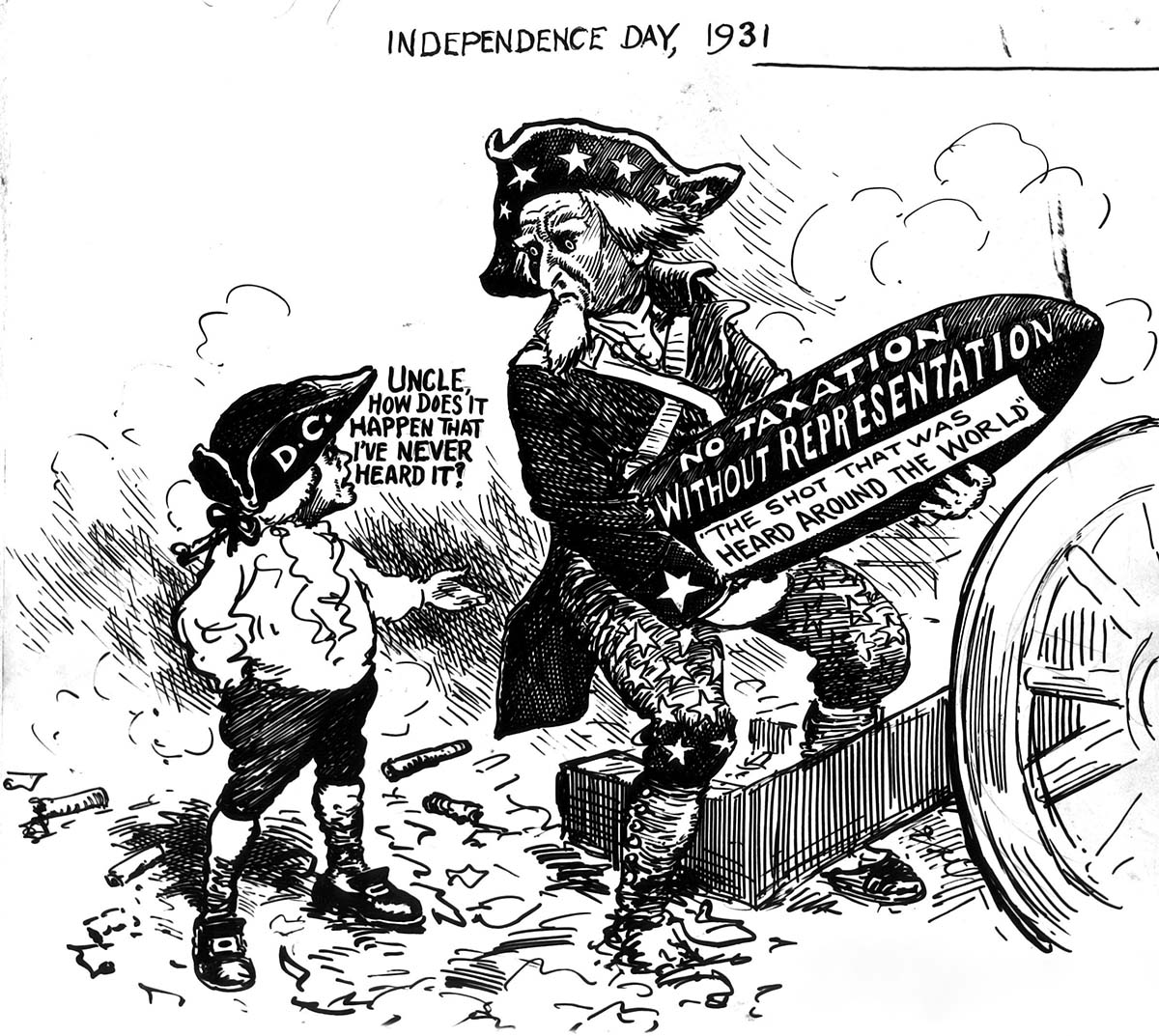Home>Finance>What Does The Term Taxation Without Representation Mean


Finance
What Does The Term Taxation Without Representation Mean
Published: November 2, 2023
Discover the meaning of the term "taxation without representation" and its impact on the field of finance. Explore the significance and implications of this concept.
(Many of the links in this article redirect to a specific reviewed product. Your purchase of these products through affiliate links helps to generate commission for LiveWell, at no extra cost. Learn more)
Table of Contents
Introduction
Taxation without representation is a term that holds great significance in the history of democratic governance. It refers to the practice of imposing taxes on a population without providing them with a voice or representation in the decision-making process. This concept has its roots in the American Revolutionary War and remains relevant in modern discussions of government accountability.
At its core, taxation without representation represents an imbalance of power between the governing authority and the governed. When a government imposes taxes on its citizens without allowing them to participate in the decision-making process, it denies them the fundamental right to have a say in how their hard-earned money is being used.
For any society that values democracy, the principle of “no taxation without representation” is a fundamental pillar. It ensures that the government remains accountable to the people, and that the power to tax is wielded in a fair and equitable manner. It is closely linked to the concept of consent of the governed, where citizens have the right to be involved in shaping the policies and laws that affect them.
While taxation itself is a necessary function of government to fund public services and infrastructure, the issue arises when citizens have no direct or indirect influence on the decisions regarding tax policies. This lack of representation can lead to frustration, resentment, and a sense of disenfranchisement among the population.
In the following sections, we will explore the historical context of taxation without representation, its connection to the American Revolution, its current relevance, and some contemporary examples that highlight the ongoing importance of this principle.
Definition of Taxation Without Representation
Taxation without representation is a concept that refers to the imposition of taxes by a governing authority on a population without giving them a voice or representation in the decision-making process. In other words, it is the practice of taxing individuals without granting them the right to participate in the political system and influence the laws that affect their daily lives.
This term emerged during the American Revolutionary War and became a rallying cry for the colonists in their fight against British rule. The slogan “no taxation without representation” encapsulated their demand for the right to have a say in how they were governed and to have elected representatives who could advocate for their interests.
Under the principle of no taxation without representation, citizens argue that they should not be subjected to taxation unless they are given the opportunity to vote for their representatives and influence the policies implemented by the government. This principle highlights the importance of democratic participation and the need for a fair and accountable system of governance.
In a democratic society, the power to tax is considered a significant tool of the government to generate revenue and fund public services. However, when this power is exercised without the consent and input of the people, it can lead to feelings of injustice and lack of trust in the government.
It is important to note that taxation without representation extends beyond the direct act of taxation. It also encompasses the broader issue of governance, where the lack of representation can result in policies and decisions that do not align with the interests and needs of the population.
While the term taxation without representation originated in the context of the American Revolution, its underlying principles continue to resonate globally. Citizens around the world strive for a political system that upholds the values of democracy, ensuring that their voices are heard, and their interests are represented when it comes to matters of taxation and governance.
Historical Context
To fully understand the significance of taxation without representation, it is essential to explore its historical context. The roots of this concept can be traced back to the American colonies’ struggle against British rule in the 18th century.
At the time, the American colonies were under the governance of the British Crown and Parliament, which had the authority to impose taxes on the colonies. However, the colonists had no representation in the British Parliament, leaving them without a voice to influence or oppose these taxation measures.
The British government, facing mounting debt from the French and Indian War, sought to generate revenue by imposing a series of acts and taxes on the colonies, such as the Sugar Act, Stamp Act, and Townshend Acts. These measures were met with strong resistance from the colonists, who argued that they had no say in the decision-making process and were being unfairly burdened by taxation.
The slogan “no taxation without representation” became a powerful rallying cry among the colonists, expressing their demand for equal rights and the recognition of their voice in matters of taxation and governance. This sentiment was encapsulated in the writings and speeches of influential figures like Patrick Henry, James Otis, and Samuel Adams, who passionately advocated for the colonists’ rights.
The tensions between the American colonists and the British government over taxation without representation eventually led to the outbreak of the American Revolutionary War in 1775. The colonists saw armed conflict as the only way to challenge the oppressive rule of the British Parliament and assert their right to self-governance.
Through years of struggle and sacrifice, the American colonies eventually emerged victorious, securing their independence from British rule with the signing of the Treaty of Paris in 1783. The concept of taxation without representation played a central role in shaping the ideals of the newly formed United States and laid the foundation for the principles of democratic governance that would be enshrined in the U.S. Constitution.
The historical context of taxation without representation serves as a reminder of the importance of citizen participation and representation in decision-making processes. It has influenced the development of democratic systems of government worldwide, highlighting the necessity of accountable governance and ensuring that the voices of the people are heard and their interests are protected.
American Revolution
The American Revolution stands as one of the most pivotal periods in history, and taxation without representation played a central role in sparking the flames of rebellion against British rule. The colonists’ fight for independence was fueled by their passionate opposition to being taxed without having a say in the decision-making process.
The British Parliament’s attempts to raise revenue through various acts and taxes, such as the Stamp Act and the Tea Act, drew vehement protests from the American colonists. They argued that they were being treated as second-class citizens, with no representation in Parliament to advocate for their interests or voice their grievances.
The colonists viewed these actions as a violation of their natural rights and the principles of self-governance. They saw themselves as English subjects, entitled to the same rights and freedoms as those living in Britain. The idea of taxation without representation not only incited anger and frustration among the colonists but also served as a unifying force that brought together different regions and social classes in their pursuit of liberty.
In response to the mounting discontent, the colonists organized boycotts, protests, and acts of civil disobedience. Groups like the Sons of Liberty played a significant role in mobilizing opposition to British taxation policies and raising awareness of the injustices being inflicted upon the colonies.
The defiance of the colonists eventually led to armed conflict with the British Crown. The shot heard round the world at Lexington and Concord marked the beginning of the American Revolutionary War in 1775. The war itself lasted for years, with the colonists facing tremendous hardships and sacrifices as they fought for their right to self-governance and representation.
Finally, on July 4, 1776, the Second Continental Congress adopted the Declaration of Independence, proclaiming the colonies’ separation from Britain and asserting their natural rights to life, liberty, and the pursuit of happiness. The principles of consent, representation, and the rejection of taxation without representation were at the core of this founding document, shaping the new nation’s vision and future government.
The American Revolution serves as a testament to the power of the people and their determination to overthrow unjust systems of governance. The fight against taxation without representation became a symbol of individual rights and the need for democratic representation, inspiring subsequent struggles for independence and democracy across the globe.
Today, the memory of the American Revolution and the principle of no taxation without representation remain an enduring part of American identity and democratic values, serving as a reminder of the importance of transparent and accountable government.
Current Relevance
The concept of taxation without representation continues to resonate in modern discussions of government accountability and citizen participation. While it originated in the context of the American Revolutionary War, its principles remain relevant in contemporary society.
Democratic governance requires that citizens have the opportunity to participate in decision-making processes, particularly those related to taxation. It is crucial for individuals to have a voice in shaping tax policies and ensuring that they align with the needs and interests of the population.
However, instances of taxation without representation can still be found in various parts of the world. These situations typically arise when authoritarian regimes impose taxes on their citizens without providing them with meaningful avenues for representation or influence over government decisions.
In some cases, governments may use taxation as a tool to suppress dissent and maintain control over the population. By implementing burdensome taxes without accountability, governments can further marginalize certain groups or stifle opposition.
Furthermore, the idea of taxation without representation extends beyond the direct act of taxation itself. It also encompasses broader governance issues, such as the lack of transparency and accountability in the use of tax revenues.
Citizens have the right to know how their tax contributions are being utilized and to demand transparency in government spending. Without adequate representation, citizens may be left in the dark about the allocation of funds and the impact of their tax dollars on public services and infrastructure.
Fortunately, democratic societies recognize the importance of representation and have mechanisms in place to ensure that citizens have a voice in matters of taxation. Through elected representatives, citizens can participate in the democratic process and influence tax policies through their votes and engagement with political institutions.
However, there is always room for improvement. It is essential for governments to foster an environment of inclusivity and provide mechanisms for greater citizen engagement. This may include initiatives such as public consultations, participatory budgeting, and open government practices that promote transparency and accountability.
The ongoing relevance of taxation without representation serves as a reminder that the principles of democratic governance and citizen participation are crucial in maintaining a just and equitable society. It underscores the importance of constantly striving for accountable and representative governments that prioritize the voices and needs of the people.
Contemporary Examples
While the concept of taxation without representation has deep historical roots, it continues to manifest in contemporary society in various forms. Here are a few examples that highlight the ongoing relevance of this issue:
-
Hong Kong: The protests that erupted in Hong Kong in recent years were fueled, in part, by concerns over taxation without representation. Many residents felt that the government’s policies and decisions lacked public input and that their tax dollars were being misused. The demand for greater democracy and representation was a driving force behind the protests.
-
Gerrymandering in the United States: Gerrymandering, the practice of manipulating electoral district boundaries to favor a particular political party, can lead to a form of taxation without representation. When districts are drawn in a way that dilutes the voting power of certain communities, it undermines the principle of fair representation and can result in policies that do not align with the interests of the broader population.
-
Tax evasion in developing countries: In some developing countries, tax evasion by the wealthy elite or corporations deprives the government of much-needed revenue. This undermines the principle of equitable taxation and places a burden on the rest of the population who may not have the means to evade taxes. Without adequate representation and accountability, these issues can persist and exacerbate existing inequalities.
-
Unequal access to public services: In some communities, there may be disparities in access to public services and infrastructure, resulting in a form of taxation without representation. For example, certain neighborhoods may face inadequate funding for schools, healthcare facilities, or transportation infrastructure, despite contributing their fair share of taxes. This lack of representation in the allocation of resources can perpetuate social and economic inequalities.
-
Corporate lobbying and influence: In many countries, corporate interests and lobbying have the potential to influence tax policies, often at the expense of ordinary citizens. When corporations have significant influence over tax legislation, it can result in loopholes and exemptions that allow them to avoid paying their fair share of taxes. This further exacerbates the sense of taxation without representation and fosters a perception of an uneven playing field.
These contemporary examples illustrate that the principle of no taxation without representation extends beyond its historical context. They highlight the ongoing need for citizen participation, transparency, and accountability in matters of taxation and governance.
Conclusion
The concept of taxation without representation has had a profound impact on the development of democratic governance and the fight for individual rights and freedoms. It originated during the American Revolutionary War as a rallying cry for the colonists, demanding their right to have a say in matters of taxation and governance. Today, the principles of representation and accountability remain relevant as we strive for transparent and responsive governments.
Taxation without representation represents an imbalance of power, where governments impose taxes on their citizens without providing them with a voice or influence in decision-making. It undermines the principles of democracy and can lead to feelings of disenfranchisement and frustration among the population.
The historical context of the American Revolution serves as a reminder of the importance of citizen participation and the rejection of unjust systems of governance. It serves as a blueprint for the fight against taxation without representation in contemporary society.
The ongoing relevance of this issue is evident in modern examples, such as protests for democracy and representation, concerns over gerrymandering, tax evasion, unequal access to public services, and corporate influence on tax policies. These examples highlight the need for citizen engagement and accountability in the governance process.
In conclusion, taxation without representation is not just a historical concept but a principle that resonates in today’s world. It calls for governments to uphold democratic values, provide avenues for citizen participation, and ensure transparency in the decision-making process, particularly in matters of taxation. By embracing the principles of representation and accountability, we can strive towards a fair and equitable society where every voice counts.














